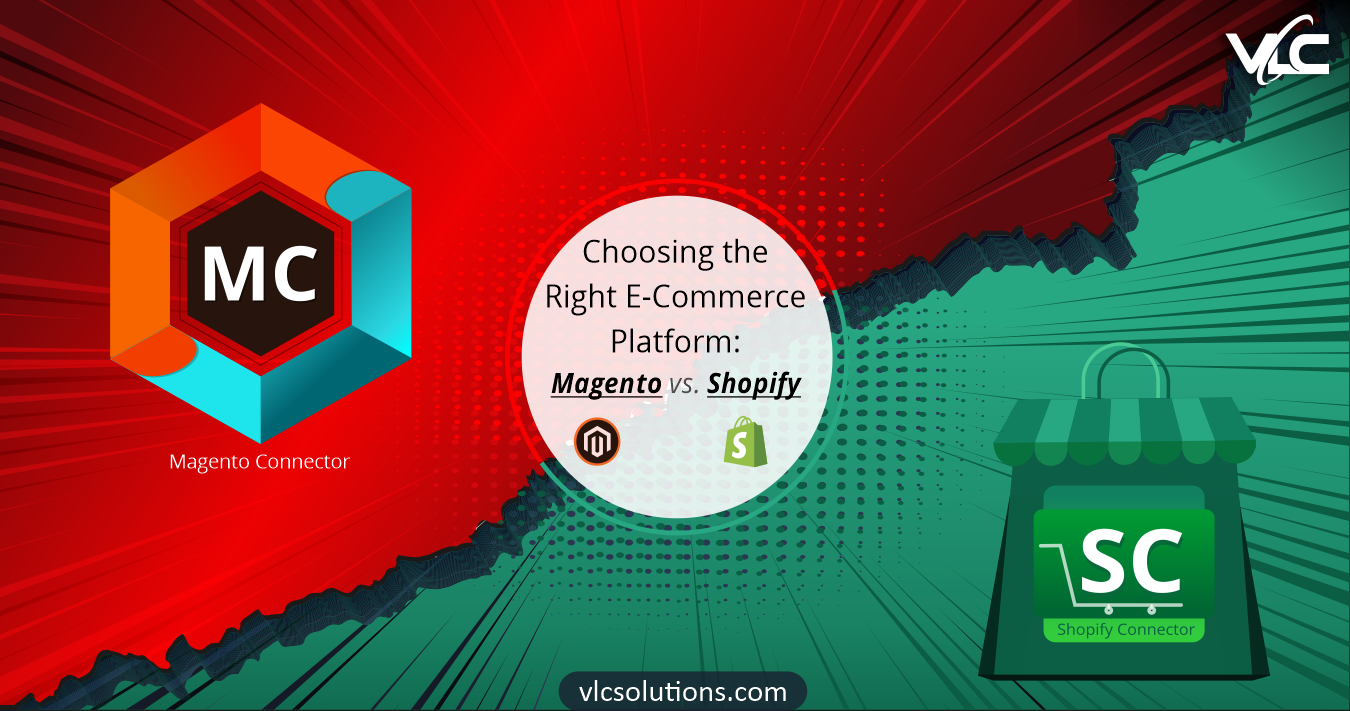Choosing the Right E-Commerce Platform: Magento vs. Shopify
Choosing the right E-commerce platform necessitates taking into account numerous aspects of one’s online store. To make such a decision, you must first consider if the online activity is Business-to-business or Business-to-consumer, the number of products available, the delivery and payment options, and the vision for your company’s customer experience. Selecting the ideal platform also entails finding one that tries to balance your specific needs as a seller with those of your customers and visitors.
In this blog post, we have contrasted Shopify and Magento, two popular E-commerce platforms with large virtual forums. Although both platforms provide distinct E-Commerce business experiences, they differ dramatically in almost every aspect, along with their intended audience.
Business Size:
The Magento platform is designed for medium to large enterprises, whereas the Shopify platform is designed for small and medium-sized businesses (SMBs) and for those who appreciate convenience over capabilities.
Flexibility:
Magento is a well-known E-Commerce superpower. It is among the most flexible E-Commerce platforms, thanks to installed functionality and add-on extensions. Magento is crafted by default to offer merchants full control over the user experience. This includes developing and selling highly configurable products and handling them throughout multiple stores if necessary. Shopify, on the other side, provides enough features for SMBs to expand and grow well. Their E-Commerce platform allows you to do a variety of things without writing a single line of code.
Gateways for Payments:
Both Magento and Shopify provide a wide range of payment gateways, such as PayPal, and others. Shopify now facilitates over 100 payment gateways, whereas Magento facilitates about 340. It would help if you were prepared to pay extra transaction fees when you use external payment systems with Shopify.
Effectiveness:
Magento is an asset application that necessitates a stable hosting ecosystem. It’s widely known that as new product SKUs (Stock Keeping Units) are added, a merchant’s hosting infrastructure can begin to experience stress. Magento, which has over a decade of experience, provides an optimized solution that employs caching to enhance site performance.
This solution cannot be found anywhere else. Shopify, in contrast, is a small program. As a result, it runs faster in most contexts and can support more product SKUs with the same hardware that could only support a relatively small Magento store. On the other hand, Shopify does not have the same degree of functionality as Magento.
Extensions and Apps:
When your store is fully operational, you may notice that certain features and capabilities are missing. This involves more advanced checkout choices, enhanced search features, and more payment systems. Magento and Shopify have a solution in the shape of one-click add-ons that you can download and set up on your site. Shopify refers to these as apps, whereas Magento refers to them as extensions.
When looking at the app and extension alternatives open to merchants on Magento and Shopify, you might very well notice a variation in the number readily accessible for each. The Magento market has over 3,524 extensions, whereas the Shopify market has over 7,000 apps.
When comparing Shopify and Magento, the volume of add-ons is important, but so is the quality. Merchants can use Shopify apps to implement their store with sociocultural and shopping streams with more shipping options, and you can also make minor changes to the necessary SEO data.
On the other hand, Magento extensions enable merchants to add advanced, pre-ordered features, generate insightful metrics into how a product is performing, combine marketing and predictive analysis software into the E-Commerce platform, and influence effective marketing tools.
Warehouse Size:
Merchants could include an infinite number of products on the Magento and Shopify platforms. They also enable you to incorporate shipping and fulfillment additions into your store, simplifying inventory management.
Even so, the bigger your Magento inventory, the more likely you will undergo performance issues if you do not update your hosting account. Shopify has common concerns, but as they host your store, they will motivate you to update your account before enduring shutdowns.
Wrapping Remarks: The Better Choice
Finally, it is entirely dependent on the requirements of your online business. Would you like to make a one-of-a-kind personalization? In that case, Magento is preferable for creating unique individualized experiences for your customers. Are you pursuing ease of use? Shopify is ideal for merchants who want to create a simple E-Commerce site with minimal coding or tech expertise.
